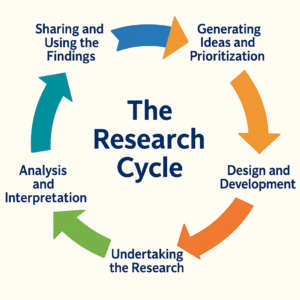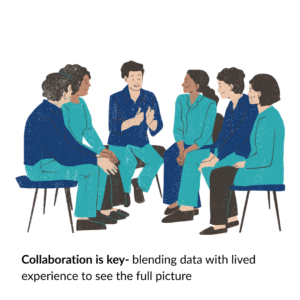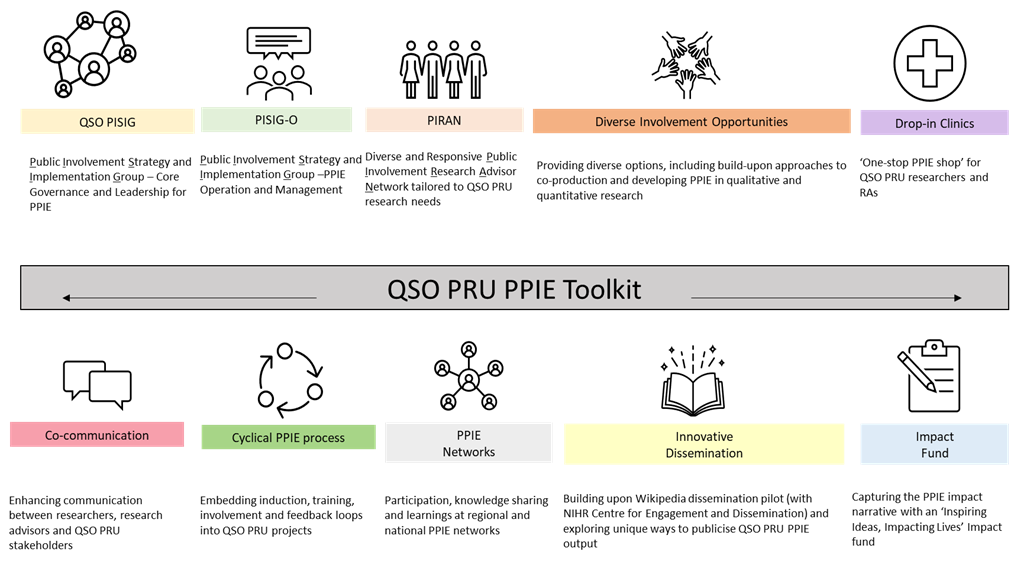In QSO PRU, our vision is for meaningful patient and public involvement and engagement, where interactions between the public and researchers facilitate a process of two-way learning and subsequent improvement of the relevance, quality and value of the research and subsequent health and care policy.
We are committed to involving the public in all stages of QSO PRU research, from early research design through to delivery and communication, and will provide opportunities to be involved at various stages of the research cycle:

Our core objectives for Public Involvement and Engagement in the QSO PRU are:
- Strategy and Governance We look at PPIE best practices and the needs of QSO researchers, and develop a strategy for how best to support these. We continually review the strategy to make sure it is working.
- Developing and Strengthening Meaningful PPIE We explore, use and refine best PPIE practices for qualitative (non-numerical information about people’s beliefs, needs, attitudes and behaviours) and quantitative research (the numbers) within QSO PRU.
- Capability Building and Training We provide diverse and inclusive involvement and training opportunities for all members involved in PPIE.
- Dissemination and Impact We involve patients and the public in publicising our work using many different methods. We then capture the overall impact of our PPIE work from all areas of the research cycle
- Knowledge Sharing and Network Building We provide opportunities for PPIE members to meet each other, share what they have learned and to learn from others within and outside of QSO PRU.
Based on our core objectives and the UK standards for Public Involvement, we will use and adapt our PPIE toolkit to help us achieve the strategic objectives of the QSO PRU:
PPIE Team
PIRAN: Our Public Involvement Research Advisor Network is a nationwide network of research advisors with different backgrounds and experiences in relation to health and social care. PIRAN advisors are matched to QSO research projects based on their personal experiences and interests. A Research Advisor can be involved in a variety of activities dependent on the scope of the project, the needs of the researchers and the research advisor’s personal interests. Examples include:
- Reviewing project materials, like a plain English summary, project applications, reports or presentations to make sure they are understandable to a wide audience, accessible and ‘jargon free’.
- Sharing knowledge, experiences, and insights gained through being a carer, patient or someone who uses health and/or care services.
- Being part of an advisory group or a new PPIE initiative.



PISIG-O
Our Public Involvement and Strategy and Implementation Operational Group feeds into all aspects of the unit’s work by providing strategic direction, monitoring and evaluating the implementation of different PPIE approaches. The membership of this group includes two PPIE Co-leads (Jennifer Bostock, Matthew Baker), two strategic PPIE Advisors (Anica Alvarez Nishio, Alison Allam) and a Public Involvement and Engagement Manager (Sarah Birch). This group is represented on the QSO PRU Management team.
Interested in Joining our Network? If you are an unpaid carer for a family or friend, have experiences of being a patient or using social care services, or have an interest in the quality, safety and outcomes of health and social care and would like to find out more about joining our Research Advisor Network, please contact our Public Involvement and Engagement Manager. If you are new to Public Involvement or this area of research, we can provide you with support and training.
Email Sarah Birch at s.j.birch@kent.ac.uk
Resources
For copies of our PIRAN Terms of Reference, PIRAN Privacy Notice, PIRAN Welcome Document, Payment Policy, Claim forms, please contact our Public Involvement and Engagement Manager on the address above.

